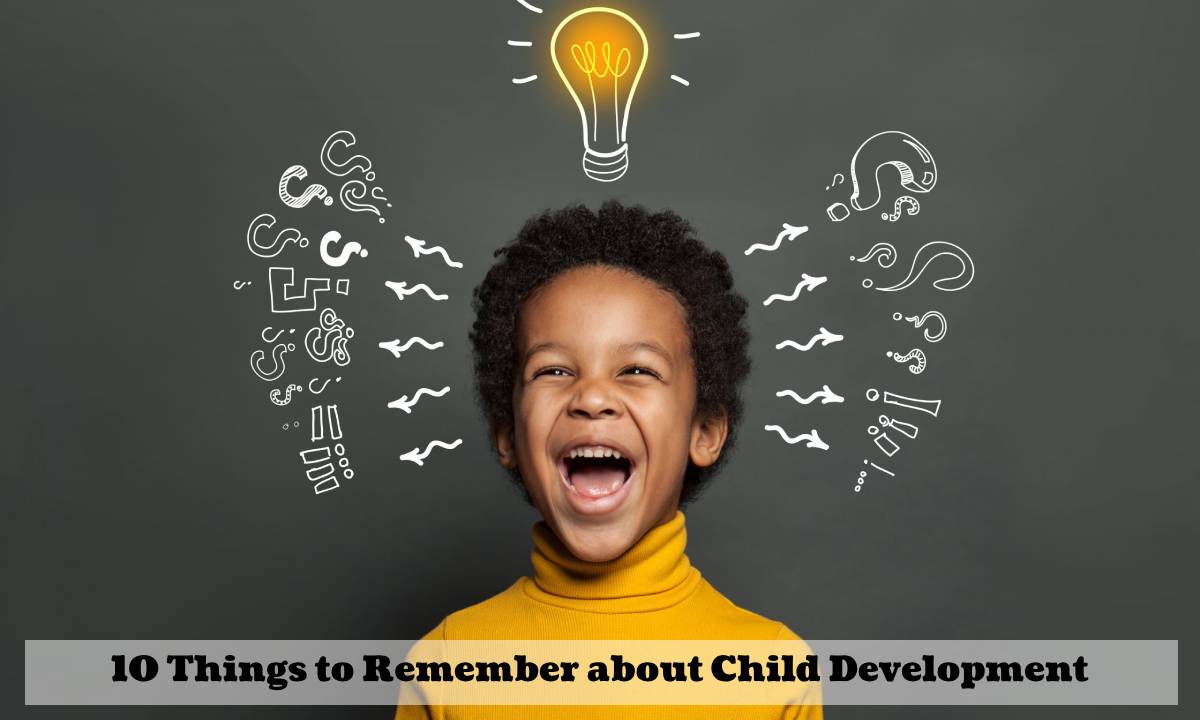
Child development is an enrapturing venture that unfurls in noteworthy ways, forming the fate of every person. Understanding the complexities of youngster improvement isn’t only advantageous but pivotal for guardians, instructors, and parental figures the same.
From the second a youngster is conceived, they set out on an intriguing journey through key progressive phases, each undeniable by unmistakable achievements and accomplishments. This excursion, including physical, mental, social, and profound spaces, establishes the groundwork for long-lasting learning and prosperity.
In this article, we dive into 10 essential aspects of child development, revealing insight into the significance and the essential stages to prepare for a kid’s development and potential. Through smart investigation, we expect to outfit perusers with significant information and experiences to sustain and uphold the improvement of every kid.
The Role of Genetics and the Environment
Understanding how hereditary qualities and the climate shape child development is vital for guardians, teachers, and analysts the same. This complicated exchange of nature and support fundamentally impacts a youngster’s development and potential.
See Also: Reflection methods: 4 creative exercises, you can succeed in the positive review
Nature vs. Nurture Debate:
The well-established question of nature versus support has long charmed researchers and clinicians, igniting banters about the overall significance of hereditary inclinations versus ecological impacts in molding a kid’s turn of events.
While hereditary qualities give the outline to a kid’s physical and mental characteristics, the climate assumes an essential part in deciding how these attributes manifest and foster after some time.
Research in this space assists us with grasping the complicated associations between acquired characteristics and outer impacts, revealing insight into the one-of-a-kind pathways of child development.
Impact of Family Dynamics:
Relational intricacies incorporate the different connections, cooperations, and encounters inside the nuclear family, all of which have a significant impact on a youngster’s turn of events. From parental sustaining and providing care practices to kin elements and family schedules, the family climate assumes a pivotal part in forming a youngster’s social, personal, and mental turn of events.
Positive relational peculiarities described by warmth, support, and viable correspondence encourage a solid turn of events, while unfriendly family conditions might present difficulties and snags that influence a youngster’s prosperity. Understanding the effect of relational peculiarities gives important bits of knowledge into how to establish sustaining and steady conditions that advance ideal child development.
See Also: Comprehensive Guide to Parental Leave
Physical Development
Physical development is a crucial part of child development, including the development and refinement of coordinated movements, as well as the dietary prerequisites fundamental for solid development.
Milestones in Motor Skills:
As kids progress through the earliest stages, toddlerhood, and then some, they accomplish huge achievements in their coordinated abilities improvement. From the early reflexes of babies to the accuracy and coordination of fine coordinated movements in more established kids, each stage marks momentous advancement in actual capacities.
Turning over, slithering, strolling, running, and ultimately dominating exercises like composition and tying shoestrings are achievements characteristic of engine expertise advancement. Understanding these achievements permits guardians and parental figures to uphold and energize their kid’s actual turn of events.
Nutritional Needs and Growth:
Appropriate nourishment is fundamental for supporting solid development and advancement in youngsters. Dietary requirements change contingent upon variables, for example, age, orientation, movement level, and individual digestion. Sufficient admission of fundamental supplements like nutrients, minerals, proteins, starches, and fats is critical for supporting the development of bones, muscles, and organs.
Furthermore, dietary propensities laid out during adolescence can have long-haul suggestions for by and large well-being and prosperity. By guaranteeing a decent eating regimen that meets their kid’s nourishing requirements, guardians assume a fundamental part in advancing ideal actual turn of events and deep-rooted wellbeing.
Read Also: Nutritional Wellbeing: Ensuring Foster Children Get the Best Start
Cognitive Development
Cognitive development shapes the foundation of a kid’s scholarly development, enveloping the securing of information, critical abilities to think, and the advancement of mental abilities.
Piaget’s Stages of Cognitive Development:
Piaget’s theory of cognitive development frames a progression of stages through which kids progress as they build how they might interpret the world. From the sensorimotor stage, where babies investigate the climate through their faculties and activities, to the formal functional stage, described by unique reasoning and coherent thinking, Piaget’s stages give a structure to understanding the mental achievements that youngsters accomplish as they develop.
By perceiving and supporting kids’ mental advancement inside each stage, guardians and teachers can encourage scholarly development and decisive reasoning abilities.
Read Also: 8 Ways For Supporting Loved Ones in Mental Health Crisis
Language Acquisition and Learning:
Language acquisition is a critical part of the mental turn of events, empowering kids to impart, offer their viewpoints, and draw in with their general surroundings. From prattling and cooing in the earliest stages to dominating complex sentence structure and jargon in later years, youngsters go through a surprising excursion of language learning.
Through cooperation with guardians, openness to language-rich conditions, and formal instruction, kids continuously foster language abilities that establish the groundwork for scholastic achievement and social collaboration.
Understanding the complexities of language securing engages guardians and instructors to establish animating conditions that help youngsters’ phonetic turn of events and by and large mental development.
Social and Emotional Development
Social and emotional development is crucial in forming a kid’s capacity to explore connections, figure out feelings, and relate to other people. This part of child development includes the ability to shape significant associations with peers, relatives, and the more extensive local area, as well as the capacity to direct feelings and exhibit compassion.
Building Relationships:
Building connections is a central part of the social turn of events, empowering youngsters to fashion associations with others and fostering a feeling of having a place.
From early collaborations with parental figures to companionships shaped in school and then some, connections furnish youngsters with open doors for socialization, participation, and common help.
Through play, correspondence, and shared encounters, kids acquire significant interactive abilities, for example, turn-taking, collaboration, and compromise, laying the preparation for solid connections throughout life.
Managing Emotions and Empathy:
Emotion regulation and empathy are fundamental parts of profound turn of events, permitting youngsters to comprehend and answer their feelings as well as the sensations of others. As youngsters develop, they figure out how to distinguish and communicate a large number of feelings, from happiness and fervor to misery and outrage.
Creating sympathy includes perceiving and grasping the viewpoints and feelings of others, as well as answering with empathy and generosity.
Through demonstrating, direction, and practice, youngsters get what it takes to explore complex social circumstances, resolve clashes, and develop steady connections based on shared understanding and sympathy.
The Influence of Play
The play holds a significant impact on kid improvement, filling in as a dynamic and complex device for learning, imagination, and socialization.
Types of Play and Their Benefits:
The play takes different structures, from inventive imagine play to organized games and proactive tasks, each offering special advantages for youngsters’ turn of events. Creative play cultivates imagination, critical thinking abilities, and close-to-home articulation, permitting youngsters to investigate various jobs and situations in a protected and innovative climate.
Actual play advances gross coordinated abilities, coordination, and actual wellness, while social play energizes participation, correspondence, and the improvement of interactive abilities. Understanding the assorted kinds of play and their related advantages engages guardians and instructors to furnish youngsters with rich and fluctuated play encounters that help comprehensive turn of events.
Play as a Learning Tool:
Play isn’t simply an interest; it is an integral asset for learning and mental turn of events. Through play, kids participate in active investigation, trial and error, and disclosure, extending how they might interpret their general surroundings. Play-based learning exercises invigorate interest, decisive reasoning, and critical thinking abilities, while likewise encouraging an adoration for learning and inborn inspiration.
Whether through working with blocks, participating in tactile play, or taking part in emotional play situations, youngsters effectively build information and get a handle on their encounters through play. Perceiving the worth of play as a learning instrument empowers guardians and teachers to establish improving conditions that advance happy learning and an all-encompassing turn of events.
Importance of Early Intervention
Early mediation assumes a vital part in guaranteeing the ideal improvement of kids, tending to likely difficulties or postponements before they heighten.
Recognizing Developmental Delays:
Recognizing indications of formative deferrals is essential for recognizing regions where youngsters might require extra help or intercession. Defers in achievements like discourse and language advancement, coordinated movements, social cooperation, or mental capacities might show basic issues that require consideration.
By checking children’s development and being receptive to warnings or advance notice signs, guardians and parental figures can find proactive ways to address concerns and look for suitable intercessions.
Seeking Professional Help:
Looking for proficient assistance is fundamental for getting particular help and administrations custom-fitted to kids’ singular requirements.
Early intercession experts, including pediatricians, formative trained professionals, language teachers, and word-related advisors, can survey children’s developmental progress, recognize areas of concern, and give designated medications and treatments.
Teaming up with experts permits families to foster customized intercession plans pointed toward advancing ideal turn of events and boosting kids’ true capacity. By looking for ideal expert help, guardians and parental figures can enable youngsters to conquer difficulties and flourish in their formative process.
Individual Differences and Diversity
Understanding and embracing individual differences and diversity is fundamental in cultivating comprehensive conditions that help the all-encompassing advancement, everything being equal.
Respecting Cultural Backgrounds:
Social foundations recognize the assorted customs, convictions, values, and practices that shape youngsters’ personalities and encounters.
By esteeming and integrating cultural perspectives into instructive and group environments, we establish comprehensive conditions where kids feel avowed and engaged to communicate their social legacy.
Advancing social mindfulness and responsiveness cultivates shared regard, compassion, and understanding among kids from various foundations, enhancing their growth opportunities and advancing positive social connections.
Understanding Neurodiversity:
Understanding neurodiversity recognizes the diverse range of neurological differences and cognitive profiles among children, including those with autism spectrum disorder (ASD), attention deficit hyperactivity disorder (ADHD), dyslexia, and other developmental variations.
Embracing neurodiversity implies valuing the one-of-a-kind qualities, difficulties, and points of view of people with different neurological profiles.
By giving facilities, backing, and acknowledgment, we establish comprehensive conditions where all kids can flourish and contribute their abilities and bits of knowledge. Understanding and embracing neurodiversity advances value, acknowledgment, and nobility for all kids, no matter what their neurological contrasts.
Parenting Styles and Their Impact
Parenting styles essentially shape the direction of child development, affecting ways of behaving, and mentalities, and results well into adulthood.
Authoritative vs. Authoritarian Parenting:
The qualification between authoritative and authoritarian parenting lies yet to be determined among warmth and control. Authoritative parents put down clear assumptions and stopping points while additionally being responsive and supportive towards their kids. This approach cultivates autonomy, self-control, and confidence, as kids figure out how to incorporate qualities and pursue mindful choices.
Conversely, authoritarian parents focus on submission and consistency, frequently utilizing severe principles and discipline absent a lot of warmth or adaptability. This approach can prompt sensations of disdain, defiance, and low confidence in kids, as they might battle to foster independence and self-assuredness.
Positive Reinforcement and Discipline:
Positive reinforcement and discipline techniques assume an urgent part in shaping kids’ way of behaving and character improvement. Uplifting feedback includes applauding and compensating positive ways of behaving and empowering kids to rehash them. This approach fortifies the parent-youngster bond and advances a positive learning climate.
On the other hand, discipline strategies expect to direct kids’ way of behaving and show them proper ways of dealing with feelings and resolving clashes. Viable discipline underscores consistency, decency, and compassion, assisting youngsters with gaining from their mix-ups and fostering discretion and critical thinking abilities.
By utilizing uplifting feedback and discipline systems, guardians can cultivate a sustaining and steady climate helpful for sound child development.
Supporting Healthy Development
Supporting healthy development in children is fundamental for establishing the groundwork for long-lasting prosperity and achievement.
Creating a Nurturing Environment:
A nurturing environment is portrayed by warmth, love, and backing, giving youngsters the close-to-home security and dependability they need to flourish. This includes laying out reliable schedules, offering applause and support, and developing solid, entrusting associations with guardians.
By establishing a safe and nurturing environment, guardians and parental figures furnish youngsters with the establishment for sound profound turn of events, self-assurance, and flexibility notwithstanding challenges.
Encouraging Exploration and Creativity:
Encouraging exploration and creativity cultivates scholarly interest, critical thinking abilities, and development in youngsters. This includes giving chances to unconditional play, involved growth opportunities, and openness to assorted interests and exercises.
By empowering youngsters to investigate their inclinations, express their thoughts, and participate in inventive play, guardians and parental figures invigorate mental turn of events, imagination, and a long-lasting affection for learning. Supporting investigation and imagination enables kids to find their assets, seek after their interests, and foster the abilities they need to prevail in school and then some.
Conclusion: Nurturing Every Child’s Potential
Taking everything into account, understanding the complexities of child development is significant for guardians, instructors, and parental figures the same. All through this article, we’ve investigated ten critical parts of child development, going from actual achievements to the impact of nurturing styles and the significance of early mediation.
By perceiving the job of hereditary qualities and the climate, advancing sound social and close-to-home turn of events, and empowering investigation and inventiveness, we can furnish kids with the help and assets they need to flourish. As we consider these fundamental focuses, let us recollect that each kid is remarkable, with their assets, difficulties, and potential.
By embracing variety, cultivating sustaining conditions, and focusing on the prosperity of youngsters, we can aggregately add to the improvement of people in the future. We urge you to share your contemplations and encounters on kid advancement in the remarks underneath and spread this important data with your loved ones to engage others in their excursion of supporting child development.







